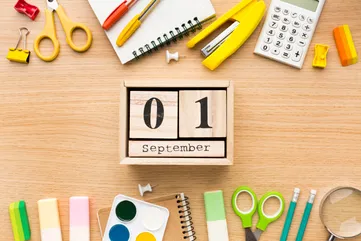Initiation
Initiation, or task initiation, is the ability to begin tasks or activities independently without excessive procrastination, preparation, or external prompting.
Why starting feels impossible
Task initiation involves complex coordination between brain regions, particularly the anterior cingulate cortex and prefrontal cortex. These areas must overcome the brain's default mode network, which prefers rest.
Research shows that task initiation difficulties strongly predict procrastination and academic problems. Students with ADHD show particular challenges with initiation, requiring external structure or pressure to begin tasks others start naturally.
Guare et al. (2013) identified task initiation as a core executive function deficit in ADHD. Rabin et al. (2011) found that college students with poor task initiation showed significantly higher rates of academic probation and dropout.
You're not alone
If your teen sits staring at homework for hours without starting, or needs you to literally begin tasks with them, initiation struggles are real. Many parents become frustrated repeating "just start!" without understanding the neurological barrier. The teen brain can genuinely struggle transforming intention into action. Families addressing initiation challenges report less frustration and better task completion.
What it looks like day to day
Student
Your teen knows they need to write an essay, has all materials ready, but sits frozen, unable to type the first word.
Parent
You watch your teen procrastinate starting simple tasks for hours, finally beginning only under extreme deadline pressure.
Tiny steps to try
Lower initiation barriers through environmental and strategic support.
- 1
Micro-starts
Make first steps laughably small. "Open document" is easier than "start essay."
- 2
Body doubling
Work alongside your teen. Parallel activity reduces initiation difficulty.
- 3
Ritual development
Create consistent pre-work routines. Same steps each time build initiation habits.
- 4
Timer tricks
"Work for just 2 minutes" often leads to continuation. Starting is harder than continuing.
- 5
Environmental cues
Set up workspace completely. [Visual readiness](/the-parent-bit/finding-order-in-the-chaos-setting-up-calendars-for-kids) triggers action.
Why initiation paralyzes teens
Task initiation requires overcoming mental inertia, which can feel impossibly difficult when executive function is still developing or compromised by conditions like ADHD.
Initiation challenges:
• Knowing where to start
• Overcoming perfectionism paralysis
• Breaking through mental fog
• Managing overwhelming feelings
• Transitioning from rest to action
• Starting without external pressure
Poor initiation isn't laziness but genuine neurological difficulty.
References
Guare, R., Dawson, P., & Guare, C. (2013). Smart but scattered teens: The "executive skills" program for helping teens reach their potential. Guilford Press.
Rabin, L. A., Fogel, J., & Nutter-Upham, K. E. (2011). Academic procrastination in college students: The role of self-reported executive function. Journal of Clinical and Experimental Neuropsychology, 33(3), 344-357.
Ready to help your teen thrive?
Get personalized 1-on-1 coaching to build better habits and boost grades. Join 10,000+ families who trust Coachbit.
Frequently Asked Questions
Should we always help our teen start tasks?
Provide scaffolding that gradually decreases. Initially, you might need to sit with them to begin. Progress to being in the same room, then just checking they've started. The goal is independence, but jumping straight to independence often means nothing gets done. Build initiation skills through supported practice.
Why can they easily start video games but not homework?
Games provide immediate rewards, clear objectives, and optimal challenge levels—perfect conditions for easy initiation. Homework often lacks these motivating features. Additionally, games activate reward circuits that facilitate initiation. This isn't moral failing but neurological reality. Understanding the difference helps create homework conditions that support initiation.
Related Terms
Executive Function
Executive function is your brain's management system that helps teens plan, focus, remember instructions, and juggle multiple tasks successfully.
Procrastination
Procrastination is delaying tasks despite knowing there will be negative consequences, often driven by emotional avoidance rather than poor time management.
Task Initiation
Task initiation is the ability to start tasks without excessive procrastination, even when the task feels boring, overwhelming, or difficult.
Related Articles

Finding Order in the Chaos – Setting up Calendars for Kids
Creating a calendar and daily schedule for kids can be beneficial to manage school, homework, extracurriculars and hobbies. Color-coding and time-blocking are helpful tools for kids with ADHD.
Read article
3 Ways an Executive Functioning Coach Can Help Your Child
Discover why executive functioning skills are crucial for your child's success. Learn how an executive functioning coach can make a difference
Read article
The 6 Best Study Skills for ADHD Teens
Learn the 6 best study skills for ADHD teens to boost their academic success. Prioritization, note-taking, dedicated study space, brain breaks, and multi-sensory learning. Find out how an ADHD coach can help!
Read article
